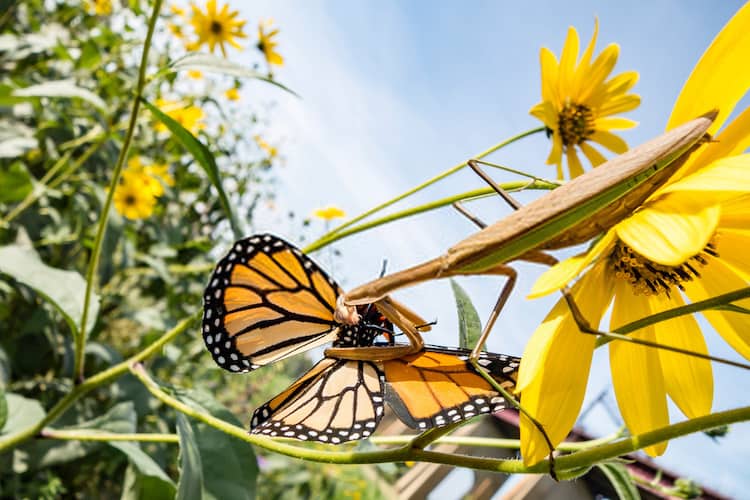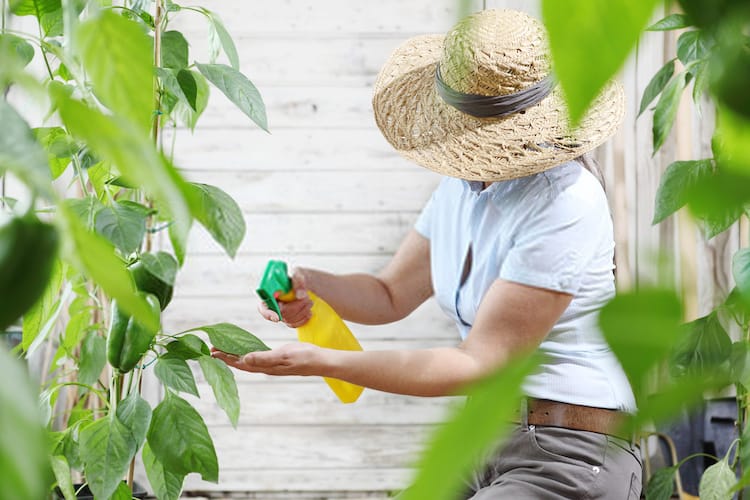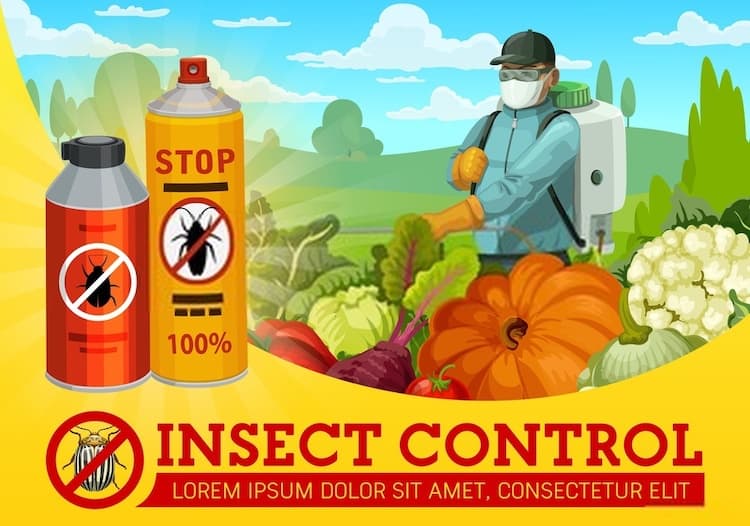We independently research and recommend the best products here. This article contains affiliate links. If you make a purchase after clicking on a link, we may earn a little commission at no extra cost to you.
Insects are one of the greatest threats to gardening. You need to act fast immediately you notice a few of them gathering and eating up your vegetables.
But here is another challenge. Not all insect killers are healthy for your vegetables. The best insect killer for vegetable garden is the one that will kill the insects and pose no risk to the health of humans, veggies, and pets.
In case you are wondering how to find them, don’t worry because we have reviewed some of them that you can start using today to improve the yield of your veggies.
Read Also: How to Protect Tomato Plants for Bugs
Table of Contents
Best Insect Killer For Vegetable Garden
What is an Insect Killer?
Insect killers are also called bug spays. They are a composition of chemicals or organics that, when sprayed around an insect's affected area in a garden, discourages them from landing or climbing the surface. While some are manufactured to kill them, others come as repellants.
Why Do you Need an Insect Killer for Your Vegetable Garden?
No matter how much preparation you do in your garden before planting, there is no guarantee that you will not have pests and insects.
We have been told that there are various ways to take care of our garden and vegetables for better yield. But even after following all the recommendations, insects may still appear because the vegetables will naturally attract them against all the odds.
If you fail to get rid of them, it will affect the yield of your garden. So, you need an insect killer for your vegetable garden to improve the health of your plant and avoid the irritation it can cause you.
Vegetable Garden Insect Killer Reviews
1. Monterey LG6135 Garden Insect Spray
The Monterey LG6135 Garden Insect Spray works effectively on all insects and all kinds of vegetable gardens. Use this for gardens affected by caterpillars, gypsy moth, trips, borers, leafminers, codling moth, tent caterpillars, fire ants, and more.
You will not notice any smell around your garden when using this product. This is great because it will be healthy for you and your plants.
It is easy to apply. Just open and pour out the required quantity into a sprayer or whatever preferred means of application and spray around the garden.
Apart from using it on vegetable gardens, you can also use this on outdoor ornamentals, lawns, vegetables, and including broadleaf weeds.
The chemicals are harmful to insects and not dangerous to you. It is made from organics, and natural bacteria called spinosad.
It comes in a container available in different sizes up to 1 gallon. It is inexpensive and has good coverage. 4 tablespoons mixed in 1 gallon of water will offer up to 1000 square feet coverage.
- Highly concentrated product
- It’s biodegradable and doesn’t contaminate
- It eliminates only insects that attack plants
- It offers excellent coverage for your garden
- It doesn’t last long enough, so it requires frequent application
2. Plantonix Organic Neem Bliss
Plantonix organic neem bliss is hard on insects and gentle on your crops. It is made from 100% organic ingredients, which makes it ideal to be used on consumable vegetable leaves.
It is recommended for organic gardening and both for indoor and outdoor use. From the planting of the seed to harvest, this insect killer protects your garden from the havoc caused by insects.
This product has a powerful garlic odor. Because of this, it may not be ideal for people who are allergic to garlic smell.
It is biodegradable, which makes it suitable for the soil as it acts as fertilizer when absorbed. It stops larval metamorphosis and also kills insects on contact.
Plantonix organic neem bliss is available in a 16oz container and offers fair coverage. Some customers do use it for other purposes, such as on pet’s hair to kill lice. It does work but not advisable.
- It is made from organic ingredients hence it is non-toxic
- It doesn’t cause side effects in small doses
- Protects and nourishes plants and soil
- Can be used for other purposes
- Offers good coverage
- It may harm pregnant women and children
- Has a strong garlic smell
- More expensive than chemical insect killers
3. Garden Safe Brand Multi-Purpose Garden Insect Killer
Despite being a multipurpose insect killer, it is specially made for vegetable gardens. This is ideal to be used on flowers, vegetables, houseplants, shrubs ornamentals, trees, and flowers.
It is effective from the period of planting the seeds right up to the day of harvest.
With its fast action, it kills insects on contact. Whether for indoor or outdoor garden, the garden safe insect killer will be useful.
It is odorless and poses no allergies to the user. It comes ready to be used. Garden safe insect killer eliminates the stress of mixing with water like some other insect killers. Simply unpack and start to spray around the garden on the upper and lower leaf surfaces.
When using this product, follow the recommended concentration to avoid harming your plants. This is a great insect killer, but unfortunately, the effect doesn’t stay long enough. You may have to apply weekly for effectiveness.
- Ideal for both indoor and outdoor use
- Non-toxic
- It has low odor
- Easy to use as it doesn’t require mixing
- Residual action guaranteed
- Also kills beneficial insects
- High concentration can be harmful on your plant
4. Ortho Scotts Company Bug B Gon Garden Insect Killer
We like the fact that it comes as a sprayer. So it gives you ease of use without having to worry about the best method of application.
It kills more than 100 types of insects you will find in a garden. Use this for aphids, beetles, hoppers, worms, borers, caterpillars, and various kinds of flies. You can find the complete list of the insects on the leaflet.
A simple application can last a long period in your garden. It is expected to provide up to 4 weeks of insect control in your garden after application.
This product is highly effective with fast killing action. It does not repeal any insect. It kills them on the spot, thus preventing them from breeding elsewhere. It is tagged as one of the fastest and safest ways to get rid of insects and pests.
The ingredients used are not harmful to your vegetables and garden produce. It comes in a 32-ounce pack. It is an excellent choice from a small home garden.
- Residual action guaranteed
- It doesn’t affect your pets
- Instantly kills over 100 kinds of insects
- Availability of spray will make application stress free
- Only works for a small garden
- Also kills harmless insects
5. Ortho 0345020 Rose and Flower Insect Killer
Whether for a vegetable garden, fruits, or flowers, this product will offer maximum protection of your crops against insects. It kills over 100 different types of insects and pests, including aphids, caterpillars, thrips, whiteflies, Japanese beetles.
The ingredient is edible, so when sprayed on veggies, it can be consumable. It is made from synthetic nicotine. It is odorless and so does not instigate allergies.
It works without disrupting the ecosystem. For example, this product is hard on a range of insects, but selective on some because insects such as bees enhance pollination, which is essential for the healthy being and reproduction of flowers.
This insect killer has a fast action on insects as it kills them within 24 hours after application. The effect remains active for up to 4 weeks.
It easy to use with the inclusion of a sprayer. Simply attach to the container, connect the batteries, and spray effortlessly.
- Won't harm plants or blooms
- Fast action as it kills insects in 24 hours
- Residual action guaranteed
- Inclusion of a sprayer
- Harmless to beneficial insects
- Killing effect is only effective for 4 weeks
- Product sold in small sizes
What to Look For When Buying a Vegetable Garden Insect Killer | Buyer's Guide
Buying insect killers for a vegetable garden is different from buying one for lawn or flowers. Garden vegetables are edible and consumable.
So you don't want to use a product that will kill the insect and pollute your plants, thus causing poisoning when consumed.
To buy the best insect killer for vegetable gardens, kindly consider the following factors.
Safe for Humans and Pets
You want to be sure that the product is safe for both humans and pets. Some insect killers are made from harmful ingredients that can trigger allergies on both pets and humans.
Some products have got systemic effects. When this is inhaled or contacted with, it can cause paralysis in squirrels and raccoons.
Always try to read up the composition if possible and check them out online if they have any effect or allergies on humans and animals.
Some products also have adverse effects on pregnant women. It is advisable to always keep pregnant women far away from the area of application.
Read Also: Plants that Grows With Watermelon
Chemical vs. Organic
Insect killers are composed of the main ingredient, either from chemicals or organics. The truth is that chemicals have a more powerful effect on insects than organic. This is why most of the insecticides used in homes are made from chemical composition.
Unfortunately, they are not edible. It can cause poisoning when you consume veggies from a garden treated with chemical insecticides.
On the other hand, organics are less potent than chemicals. This is why most of the inset killers made from organics may take up to 24 hours to see the effect. However, recent organic insect killers have been improved to compete with the chemical counterpart.
When it comes to vegetable gardens, it is highly recommended to only use organic insect killers.
Range of Action
By this, we mean how selective the insect killer is. Some insect killer kills just any insect it comes in contact with. But the truth is that not all insets are bad.
Insects are part of the ecosystem. Some few insects, just as we have initially stated, help in pollination.
The absence of these insects will mean poor reproduction, especially when it comes to the budding of flowers and the production of fruits.
If you grow flowers or plants where the production of fruit is outstanding, products like the is recommended.
Duration
How long the insect killer can stay active on your garden determines how often you will need to reapply. There are other jobs to perform in your garden. So you do not want to waste time and effort on applying insect killers weekly or daily.
Most organic insect killers stay up to 4 weeks after application. However, a few require that you apply them weekly.
Price
The price is another factor you should consider when buying an insect killer. Do not be deceived; the price tag on most of the products may seem cheap. You can have a spray priced at a few dollars
This is not what you should be looking at. The coverage it offers is what differentiates the cost of one from the other. Compare the price to how much it can cover, then you will be able to decide if the product is expensive or not.
Read Also: Causes of White Powdery Mildew on Plants
Types of Garden Pest Control
Depending on the type of plant cultivated in your garden and the type of insects, there are different types of pest and insect control.
In this section, we will be covering all the aspects so that you can have an idea about purchasing the right insecticide for your garden.
Insecticides
They are a type of insect killers that are made from chemicals. They are applied to areas being attacked by insects. Use insecticide for ants, snails, wasps, etc. It is ideal to be applied only after the activities of these insects have begun.
Pesticides
Pesticides are chemicals that are used to kill and stop the activities of insects and pests. Pests that fall in this category include and not limited to snails, slugs, fungus, and bacteria. Most insecticides are also classified as pesticides.
Herbicides
Some beginner gardeners often mistake herbicides for insect killers. But they are not. Herbicides are chemicals that kill weeds. But sometimes, weeds can be considered as pests on a general basis.
Botanical (Organic)
These are the common types of insect killers used today. They are made from organic ingredients – and they are non-toxic to humans, pets, and the environment.
Organic pest killers have become the best choice when it comes to vegetable gardens. Some of the common ingredients used are spinosad, pyrethrin, and neem oil.
Essential Plant Oil
These are also organics. They are healthy to be used on gardens that grow consumable fruits and veggies. Some of the recommended essential plant oil includes eucalyptus, citronella cedar, lavender, and rosemary.
It should be noted that essential plant oil can only be used as preventive measures. They do not kill insects when they have already attacked.
How to Spray An Insect Killer On a Garden
So you have purchased a good insecticide to apply to your garden. While you can just go ahead and spray the yard following the instructions, there are some safety precautions you can observe to have an effective job and further prevent the spread.
- Remove all affective leaves and branches. This will help stop the spread of diseases from one plant to the other.
- Introduce organic fertilizers, soil, and compost. A healthy soil will strengthen the plants to fight against diseases. If possible, you may change the soil every year.
- Different diseases affect different crops. So changing the type of vegetable you plant each season will help reduce the effect of diseases.
- Weed the garden as often as possible. Do you know that high grasses around the garden provide a breeding environment for insects and pests?
- Always clean your pruning tools. Tools that are dirty or contaminated can spread diseases from one plant to another.
- When applying insect killers, wear gloves, boot, and cover clothes. This will help prevent agitation of your skin or allergies from the chemical or organics.
- Wash your hands and clean your clothes as often as possible. Diseases can spread from your clothes to the plants.
Frequently Asked Questions
Is Vinegar a good bug repellent?
Many people do use a mixture of vinegar and water as DIY means to kill and get rid of insects and bugs. It does work fine, but it is not recommended to be used because it can be more expensive and will not have a long-lasting effect as compared to real insect killers.
Which is the best insect killer for lawns? Chemical or organic?
Comparing chemicals and organic, chemicals are more powerful and have a long-lasting effect on the area applied. Lawns are not a consumable garden; hence chemical insecticide will not be a bad idea.
How to keep bugs from eating my plants?
There are various methods to get rid of bugs and insects from your plants. The best and common method is to apply insecticide. Always endeavor to use the right concentration, as stated in the instruction from the manufacturer.
Do insect killers kill bees?
Insect killers are made from different formulas and ingredients. So all do not function the same way. Some are not selective, so they kill all insects eventually. Some good insecticides spare the harmless insects.
How many days should I wait to see dead insects in my garden?
It depends on the effectiveness of the insecticide you are using. The chemical-based killer kills insects almost immediately. Organic-based insecticides kill within 24 hours. However, you should see a result within 1-2 days.
Are organic insect killers safe for pregnant women?
This is dependent on the composition of the product. Some are not safe for pregnant women. Whether chemical or organics, it is safer to always keep them far away from the area of application.
Is it safe to apply organic insect killers on fruits and vegetables?
It is always important to follow the instruction that comes with the product. But generally, depending on the concentration, it is safe to apply organic insect killers on fruits and vegetables.
Conclusion
The best insect killer for vegetable gardens should be able to kill all harmful insects eating up your vegetables and crops. They are hard on selected insects and not just all insects, including those that contribute to the ecosystem.
And just to recall, when it comes to gardens where edible crops are cultivated, only use products made from organic ingredients.
This article should have been able to answer all questions about controlling insects and pests in your garden. If you have any personal questions, do leave us a message or comment, and we will be delighted to help.








Leave a Reply